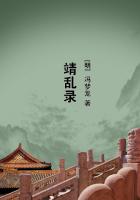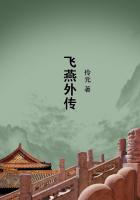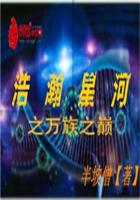Nietzsche was not an iconoclast from choice. Those who hastily class him with the anarchists (or the Progressivists of the last century) fail to understand the high esteem in which he always held both law and discipline.
In verse 41 of this most decisive discourse he truly explains his position when he says: "...he who hath to be a creator in good and evil--verily he hath first to be a destroyer, and break values in pieces." This teaching in regard to self-control is evidence enough of his reverence for law.
Chapter XXXV. The Sublime Ones.
These belong to a type which Nietzsche did not altogether dislike, but which he would fain have rendered more subtle and plastic. It is the type that takes life and itself too seriously, that never surmounts the camel-stage mentioned in the first discourse, and that is obdurately sublime and earnest. To be able to smile while speaking of lofty things and NOT TO BEOPPRESSED by them, is the secret of real greatness. He whose hand trembles when it lays hold of a beautiful thing, has the quality of reverence, without the artist's unembarrassed friendship with the beautiful. Hence the mistakes which have arisen in regard to confounding Nietzsche with his extreme opposites the anarchists and agitators. For what they dare to touch and break with the impudence and irreverence of the unappreciative, he seems likewise to touch and break,--but with other fingers--with the fingers of the loving and unembarrassed artist who is on good terms with the beautiful and who feels able to create it and to enhance it with his touch. The question of taste plays an important part in Nietzsche's philosophy, and verses 9, 10 of this discourse exactly state Nietzsche's ultimate views on the subject. In the "Spirit of Gravity", he actually cries:--"Neither a good nor a bad taste, but MY taste, of which I have no longer either shame or secrecy."Chapter XXXVI. The Land of Culture.
This is a poetical epitome of some of the scathing criticism of scholars which appears in the first of the "Thoughts out of Season"--the polemical pamphlet (written in 1873) against David Strauss and his school. He reproaches his former colleagues with being sterile and shows them that their sterility is the result of their not believing in anything. "He who had to create, had always his presaging dreams and astral premonitions--and believed in believing!" (See Note on Chapter LXXVII.) In the last two verses he reveals the nature of his altruism. How far it differs from that of Christianity we have already read in the discourse "Neighbour-Love", but here he tells us definitely the nature of his love to mankind; he explains why he was compelled to assail the Christian values of pity and excessive love of the neighbour, not only because they are slave-values and therefore tend to promote degeneration (see Note B.), but because he could only love his children's land, the undiscovered land in a remote sea; because he would fain retrieve the errors of his fathers in his children.
Chapter XXXVII. Immaculate Perception.
An important feature of Nietzsche's interpretation of Life is disclosed in this discourse. As Buckle suggests in his "Influence of Women on the Progress of Knowledge", the scientific spirit of the investigator is both helped and supplemented by the latter's emotions and personality, and the divorce of all emotionalism and individual temperament from science is a fatal step towards sterility. Zarathustra abjures all those who would fain turn an IMPERSONAL eye upon nature and contemplate her phenomena with that pure objectivity to which the scientific idealists of to-day would so much like to attain. He accuses such idealists of hypocrisy and guile; he says they lack innocence in their desires and therefore slander all desiring.
Chapter XXXVIII. Scholars.
This is a record of Nietzsche's final breach with his former colleagues--the scholars of Germany. Already after the publication of the "Birth of Tragedy", numbers of German philologists and professional philosophers had denounced him as one who had strayed too far from their flock, and his lectures at the University of Bale were deserted in consequence; but it was not until 1879, when he finally severed all connection with University work, that he may be said to have attained to the ******* and independence which stamp this discourse.
Chapter XXXIX. Poets.
People have sometimes said that Nietzsche had no sense of humour. I have no intention of defending him here against such foolish critics; I should only like to point out to the reader that we have him here at his best, poking fun at himself, and at his fellow-poets (see Note on Chapter LXIII., pars. 16, 17, 18, 19, 20).
Chapter XL. Great Events.
Here we seem to have a puzzle. Zarathustra himself, while relating his experience with the fire-dog to his disciples, fails to get them interested in his narrative, and we also may be only too ready to turn over these pages under the impression that they are little more than a mere phantasy or poetical flight. Zarathustra's interview with the fire-dog is, however, of great importance. In it we find Nietzsche face to face with the creature he most sincerely loathes--the spirit of revolution, and we obtain fresh hints concerning his hatred of the anarchist and rebel. "'Freedom' ye all roar most eagerly," he says to the fire-dog, "but I have unlearned the belief in 'Great Events' when there is much roaring and smoke about them. Not around the inventors of new noise, but around the inventors of new values, doth the world revolve; INAUDIBLY it revolveth."Chapter XLI. The Soothsayer.
This refers, of course, to Schopenhauer. Nietzsche, as is well known, was at one time an ardent follower of Schopenhauer. He overcame Pessimism by discovering an object in existence; he saw the possibility of raising society to a higher level and preached the profoundest Optimism in consequence.
Chapter XLII. Redemption.















